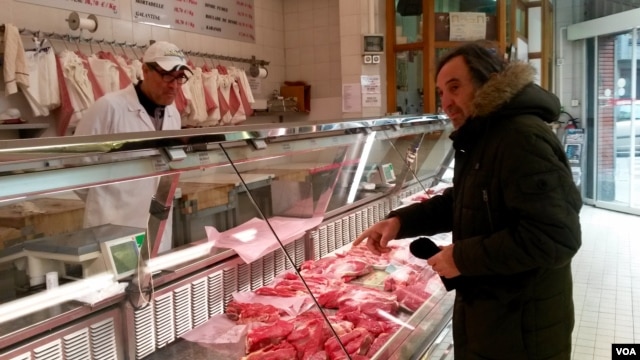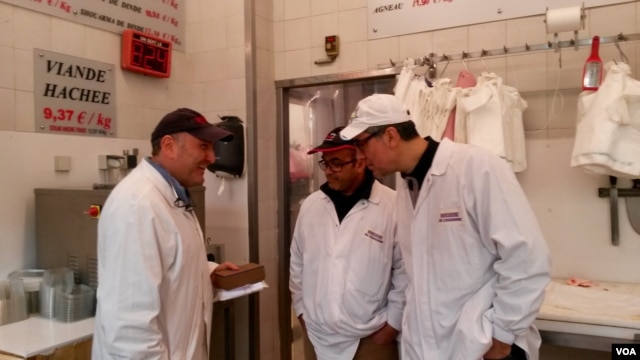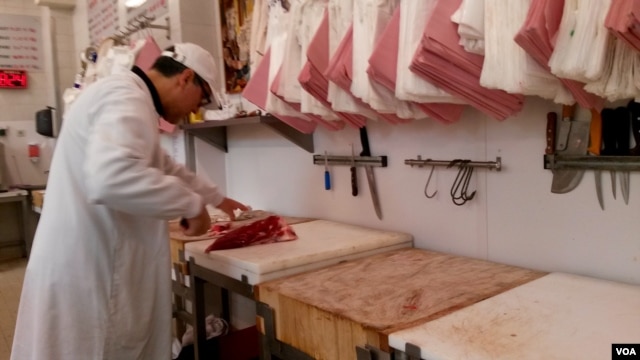PARIS—
Jean Aboucaya ponders over slabs of meat, laid out temptingly behind a wide counter. The French Algerian has driven across Paris to shop with the guarantee his purchases meet Jewish dietary laws.
“I’ve been coming here for years,” he says of the Boucherie de l’Argonne, located in the city’s northeastern 19th arrondissement. “This is the best butcher in town.”
It’s Friday morning. In about an hour, the store will be shuttered. Muslim employees will head to afternoon prayers. The Jewish ones will prepare for Shabbat.
“We work well together,” says Philippe Zribi, a Tunisian-born Jew whose family runs the shop. Nodding towards his staff, mostly Muslims who, like himself, hail from North Africa, he adds, “We have a lot more in common than with other foreigners.”
In a city still recovering from last year’s deadly Islamist attacks, and with news regularly peppered with reports of anti-Semitism, this kosher butcher under an abandoned railroad track offers a more positive face of interfaith relations.
It also reflects the melting pot that defines the 19th arrondissement, where 200,000 residents represent no less than 120 nationalities.
Jews, Muslims co-exist
With an estimated 30,000-40,000 Jews living in the 19th, the district represents the largest Jewish population of any western European neighborhood, according to local Deputy Mayor Mahor Chiche. It also hosts a sizeable Muslim population that mostly hails from North and sub-Saharan Africa.
“There’s a real mix, both socially and religiously,” says Chiche, who is in charge of community relations in the 19th.
Butcher Abdel Haq takes a question from a customer at Boucherie de l'Argonne, in Paris, Feb. 3, 2016. ( L. Bryant/VOA)
“The older generation, who lived together in Algeria, Tunisia or Morocco, they know each other. They speak Arabic, Hebrew and French, but the younger generation has a harder time getting to know each other. More work needs to be done there.”
Across the country, anti-Muslim acts tripled last year to nearly 400, according to France’s Interior Ministry. Muslim associations say many more were not reported. Anti-Jewish acts were double that number in 2015, although they were down slightly from the year before.
“The first targets are synagogues and Jewish schools and centers,” says Sammy Ghozlan, who heads the National Bureau of Vigilance Against Anti-Semitism, a watchdog group. “Now, with the army guarding them, of course there will be fewer attacks.”
While official reports don’t mention the origins of the perpetrators, Ghozlan and many other Jews blame young, disaffected Muslims and, to a lesser degree, the far-right.
Blaming community outsiders
A new and unusually frank survey by the private IPSOS polling agency finds more than two-thirds of French Jews believe anti-Semitism has greatly increased during the past five years. More than one-quarter of all French respondents said they had personally encountered insults and other problems with Muslims during the past year, according to the report commissioned by the French Judaism Foundation and published in a French newspaper Sunday.
About 13 percent of respondents said there were too many Jews in the country, rising to 18 percent among Muslim respondents.
Philippe Zribi (L) is seen with employees at Boucherie de l'Argonne, in Paris, Feb. 3, 2016. (L. Bryant/VOA)
But Deputy Mayor Chiche says Jewish-Muslim tensions have abated in recent years. “In 2000, we had big incidents, like attacks on restaurants,” he says. “Today, anti-Semitism exists, but you can walk around with a kippa [yarmulke] in the 19th without a problem.”
French sociologist Michel Wieviorka says terrorist attacks have led to greater understanding among Jewish and Muslim communities.
“The real violence doesn’t come from the communities as such, but by individuals who are not part of their communities,” he says.
A prominent French rabbi, Michel Serfaty, who works on expanding Jewish-Muslim dialogue, agrees. Since the November attacks, a number of Muslim groups have been reaching out to him, he says.
Coming together at Boucherie de l’Argonne
Leontine Duobongo, from Congo-Brazzaville, hesitates over cuts at the meat counter. Raised a Christian, she converted to Judaism a few years ago.
The store’s kosher certification also draws many Muslim customers, Zribi says. “Their biggest concern is for the meat to be properly drained of the blood,” he says of a custom also observed by Halal butchers, “and they know that’s the case here.”
Meat is being prepared at Boucherie de l'Argonne, in Paris, Feb. 3, 2016. (L. Bryant/VOA)
A native of Tunisia, Zribi moved to Paris as a toddler in the 1960s, joining North African Jews leaving their homelands after independence. In the 1980s, his father opened the butcher's shop that Zribi now runs with a brother.
During lunch breaks, the butchers sometimes share meals. The Zribi family has installed a prayer room for their Muslim employees. Conversations are sprinkled with the Arabic from their homelands.
Mustafa Makhoukh, a Muslim from Morocco, has been employed at the shop for 18 years, a job he said he got “by chance.”
“We have good times and laughs,” he says. “It’s like a family.”
“Working with Jews isn’t a problem,” says Muslim butcher Abdel Haq.
“We lived with Jews in Morocco. When it comes to religion, each person has his own convictions.”
Last year’s terrorist attacks also draw the staff together. The shootings and bombings were indiscriminate, killing a wide sampling of city residents.
Butcher Zribi lost two Italian friends during the attacks. Haq says he lost nobody, but remains shaken by the incident.
“The only lesson I can offer is not to be afraid of the other person,” he says. “If I find myself next to a Jew at a cafe, we’ll talk. We have to go toward the other.”
VOICE OF AMERICA, Lisa Bryant, 3 février 2016









